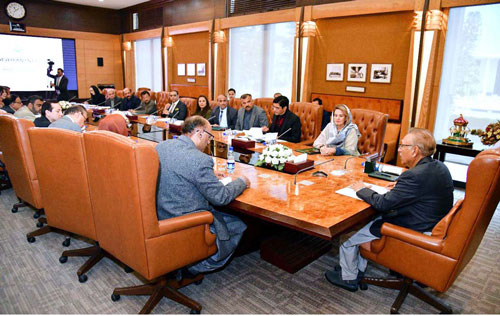President Dr Arif Alvi on Friday underlined the need to adopt a well-thought-out, data-driven and time-bound comprehensive approach for complete integration and mainstreaming of persons with disabilities (PWDs). The step, he said, would ensure the empowerment of persons with disabilities enabling them to contribute to the progress and development of the country. He said the PWDs should be proactively integrated into society as equal members by improving their mobility and accessibility to public facilities, and providing them with education, skills, and jobs.
The president expressed these views during a briefing on the mobility and accessibility issues of persons with disabilities here at the Aiwan-e-Sadr. The Chief Commissioner Islamabad, representatives of Capital Development Authority (CDA), Federal Directorate of Education, Islamabad Chamber of Commerce and Industry, World Health Organization, Ministry of Federal Education and Professional Training, National Information Technology Board and Ministry of Housing and Works, Secretary Private Educational Institutions Regulatory Authority ICT (PEIRA), and other senior government officials attended the meeting.President Alvi called for providing Assistive Technologies (ATs) and creating jobs corresponding to or suitable for the persons with specific disabilities such as hearing, visual, physical or cognitive for their financial and economic empowerment.
He highlighted that as per varying estimates, 10 to 15 percent of Pakistan’s population or almost 22 million people were PWDs, saying such a huge population could be transformed into a valuable asset, provided they were integrated and assimilated into the society. He emphasized on ensuring the proper upbringing of the persons with disabilities from birth, meeting their specific needs of food, education, sports, and learning, providing them with Assistive Technology, and assimilating them as equal members in daily tasks.
The president also called upon the relevant institutions in the public and private sectors as well as international organizations to join hands to review the existing laws while keeping in view the special needs of PWDs, and benchmark international best practices to propose amendments to the existing legal framework, besides proposing the enactment of new laws to establish a comprehensive PWD-friendly legal framework for ensuring their inclusion and integration in the society as equal and capable members. bDuring the meeting, the president also stressed the importance of developing close linkages with institutes of higher learning, Capital Development Authority and municipal corporations of other cities, chambers of commerce and industry across the country, and architecture firms to evolve a mutually agreed upon mechanism to transform public spaces into PWD friendly spaces.
The president said the relevant regulatory authorities should be fully geared to undertake a comprehensive and authentic audit of all public and private buildings, infrastructure, schools, and health facilities to create an authentic database to provide a baseline.










